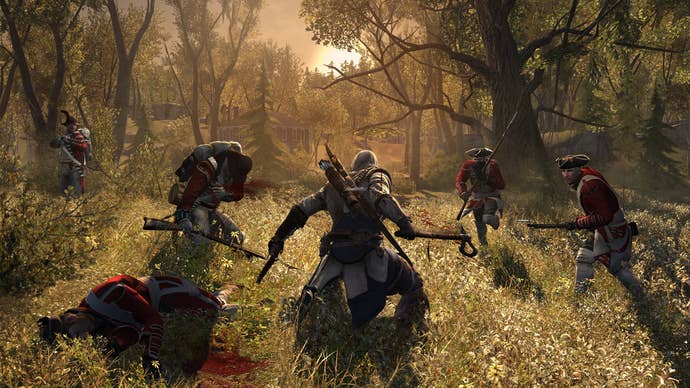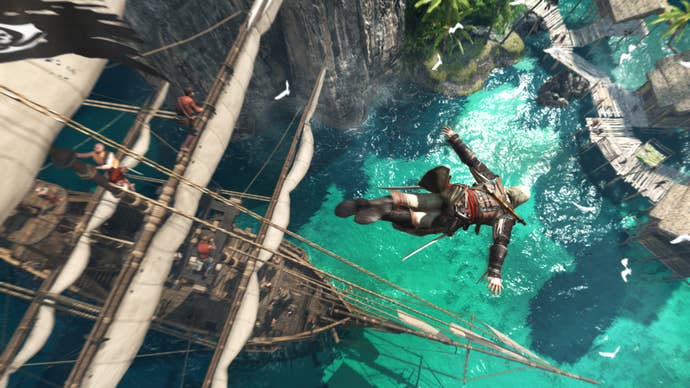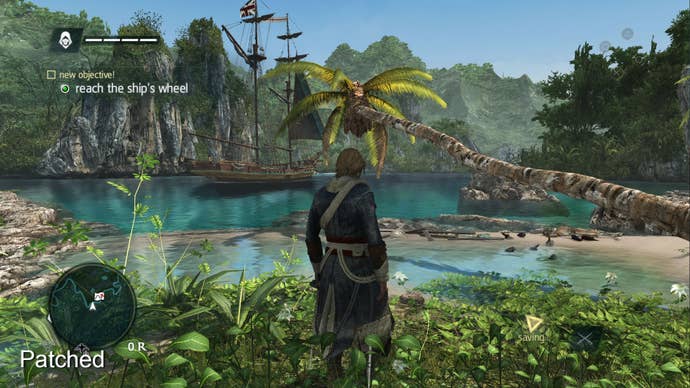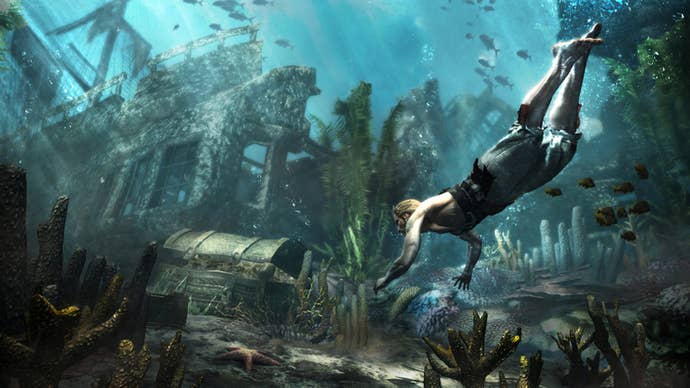Why Assassin's Creed IV: Black Flag Remains The Best In The Series
A look back on Ubisoft's amazing evolution of what Assassin's Creed was.
This article first appeared on USgamer, a partner publication of VG247. Some content, such as this article, has been migrated to VG247 for posterity after USgamer's closure - but it has not been edited or further vetted by the VG247 team.
It's early 2013 and the Assassin's Creed machine at Ubisoft is in full swing. In 2007, the publisher took a chance with a new title, establishing the ongoing, endless war between the Assassins and the Templar Order. Two years later, they refined the concepts started in the first game, creating Assassin's Creed II. That game moved from the Holy Land to Renaissance Italy, and traded out the dour Altair for the charming Ezio Auditore da Firenze.

The jump to the sequel firmed up the game's framing story: these adventures of Altair and Ezio were experienced through the genetic memory of their ancestor, Desmond Miles. Most of the game took place in the past, but you were actually Desmond reliving those lives in the near-future of our modern day, via a device called the Animus.
Assassin's Creed II was also the beginning of Ubisoft settling into annual release pace with the franchise. ACII was followed by Assassin's Creed: Brotherhood, a title that continued Ezio's story, perfected the formula, and still stands as one of the high points in the franchise. 2011 saw the release of Assassin's Creed: Revelations, which was a rough end to Ezio's life. While ACII and AC:B felt fresh and innovative, Revelations was a bit of a retread and new mechanics like hideout sieges, didn't feel like they fit within the series. The franchise didn't completely fall over, but the momentum was slowed.

2012 moved from Ezio's tale to a pair of adventures in early colonial America: Assassin's Creed III and Assassin's Creed III: Liberation. While the latter was a spin-off title built for the PlayStation Vita, the former represented the first real sequel in three years. Ezio was replaced with Connor, a half-English, half-Mohawk warrior with ties to both the Assassins and Templars. Ubisoft moved to the new AnvilNext engine for the game: Connor could climb trees and sail in the Atlantic in a pair of series' firsts. ACIII also saw the end of Desmond's tale in an ignoble demise. Unfortunately, it was an uneven experience; it wasn't horrible, but it didn't live up to the pedigree of Assassin's Creed: Brotherhood.
A year later, the PlayStation 3 and Xbox 360 were on the way out, being replaced that year by the PlayStation 4 and Xbox One. It's worth stepping back for a second to realize that Ubisoft had released five Assassin's Creed games within the same generation. Assassin's Creed, Assassin's Creed II, Assassin's Creed: Brotherhood, Assassin's Creed: Revelations, and Assassin's Creed III all launched on the PlayStation 3 and Xbox 360. (A PC release wasn't always a given, usually quite delayed when it did happen.)

Assassin's Creed IV: Black Flag was a trailblazer though. It was launching on the PlayStation 3 and Xbox 360 like its predecessors, but it would also see a PlayStation 4 and Xbox One release a month later. For the first time, Ubisoft had the chance to bridge the gap between consoles.
Black Flag was still an Assassin's Creed game, but it left the land-based shenanigans behind for a high seas adventure. Edward Kenway—the grandfather of Assassin's Creed III's Connor—wasn't a hero or even a member of the Assassin Brotherhood, he was a pirate that stole the outfit for personal gain. Edward hobnobbed through the Caribbean during the Golden of Age of Piracy, counting Blackbeard, Mary Read, Anne Bonny, and Charles Vane as friends and contemporaries. He had that same cocksure swagger present in Ezio's first outing.
There's a moment when Black Flag falls into place for me. Edward is doing the Assassin thing, climbing buildings, running through alleys, and shanking guards with his Hidden Blade. But then, you decide it's time for a change in scenery. Edward goes sprinting down to where his ship, the Jackdaw, is waiting. Your boots land on the deck and you just begin sailing. It's a seamless experience, jumping from land to the high seas.

Assassin's Creed III featured on-ship segments, but they were separate from the main game. Here, both ideas are joined in a single core, and it just works. You were always free to go wherever in Assassin's Creed: that's part of the idea of the open-world. But this jump from terra firma to the deep blue sea, it feels freeing. There's a sense of exploration and freedom borne of the fictional idea of pirates: a concept forged by classic pulp serials and television shows like Captain Blood (featuring Errol Flynn), Sinbad the Sailor, Treasure Island, Captain Kidd, and The Buccaneers.
Black Flag offers up that feeling in a way that honestly no other game has before or since. It's a great Assassin's Creed game, but at points you can see the traditional Assassin's Creed side straining under the weight of years of development. Assassination and stealth were solid and strong, but instant fail tracking missions, glitches, and the lack of an easy way to get down from high places without killing yourself were all missteps. To be clear, these were issues carried forward from the best games in the series, they just continued to haunt the franchise.
None of that matters though, because the stuff on land worked well enough, the stuff on the high sea was sublime, and the gulf between the two was non-existent. Nothing was holding you back. To use part of the series' catchphrase: everything is permitted. Go find some unexplored islands. Go destroy and pillage some ships. Take up an assassination contract that'll see you chasing one target from land to sea. Swing from your mast by a ropeline and dive into the crystal clear ocean.

That "crystal clear" was also a big part of Black Flag's charm. The game looked good on the last generation of consoles, but jump to PlayStation 4 and Xbox One offered such a vibrant and beautiful world to explore. The detail put into the wood, canvas, and ropes of the Jackdaw and other ships. The waves and sea spray as your ship cut through the ocean, or the massive waves of a vicious storm. Of particular joy to me is just sitting in the mix between ocean and land: on the beaches there was water lapping at your feet, the gorgeous shallows a few feet in one direction and jungle plants waving in the breeze in the other. And beyond that, the signs of civilization.
Black Flag stands above the best of the series is because it carries forward what Assassin's Creed II and Assassin's Creed: Brotherhood did well, while also forging new ground for the franchise. Edward Kenway is as charming as Ezio in his own way and his journey from opportunist to heroic outlaw is a good one. Stealth and climbing remains as solid as it was in the past entries. The Caribbean offered Ubisoft a chance at a bit more color than the darker American Revolution, and moving to the next generation of consoles meant it looked amazing. Black Flag was even so good that it may have ruined the franchise for some folks; those who simply want another pirate game, instead of one involving the assassins.

And it still holds up. I may miss parkour down (introduced in Unity), but Assassin's Creed IV: Black Flag is still a high point in my PlayStation 4 library. For me, it's the best in the series, followed closely by Assassin's Creed: Brotherhood. Assassin's Creed Origins has the chance to repeat the feat, coming from the same creative director as Black Flag and showing players the beginning of the Assassin Brotherhood. Will Assassin's Creed Origins be another revitalization of the franchise after Unity and Syndicate? We'll see when our review hits this Thursday.

